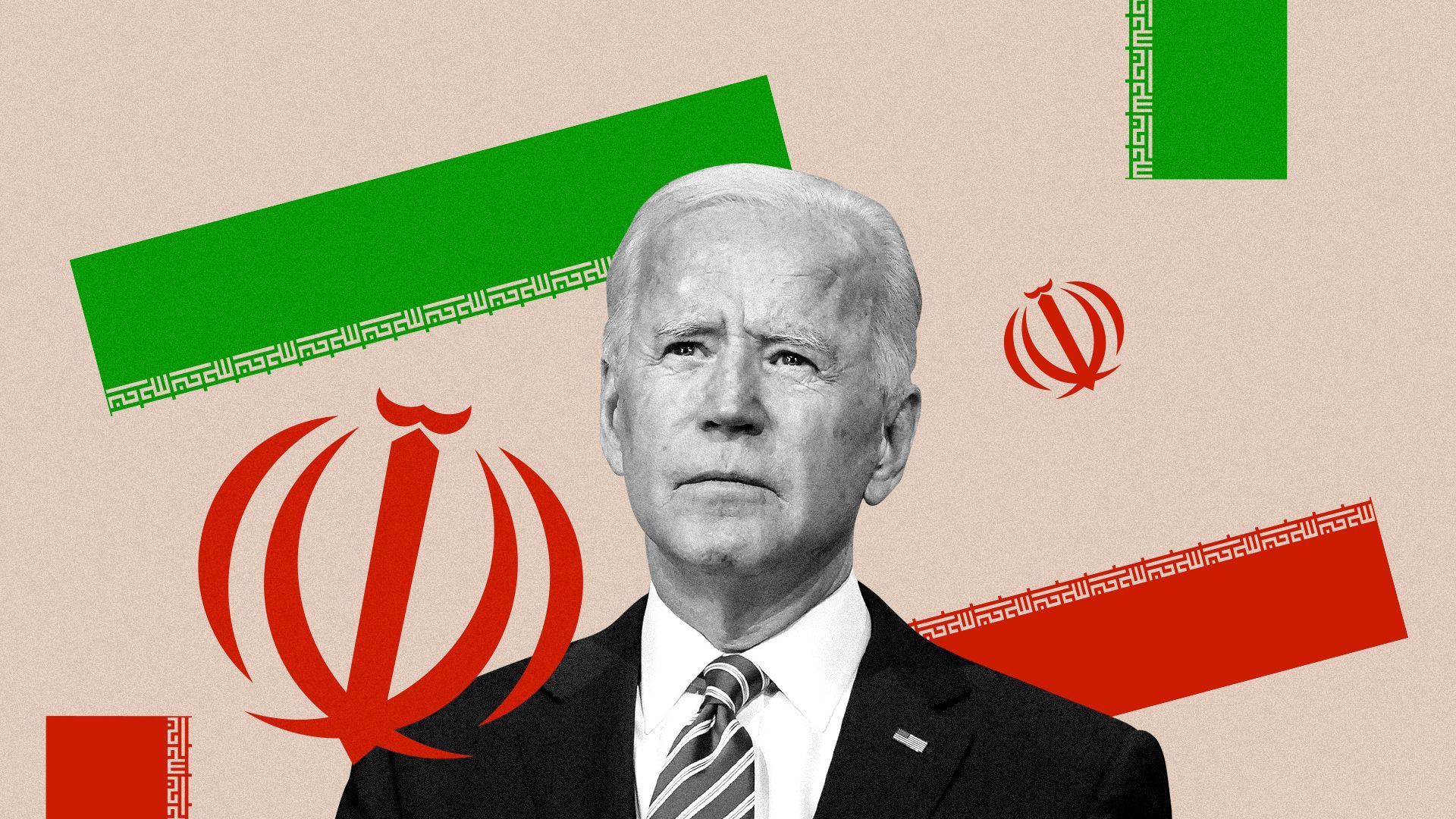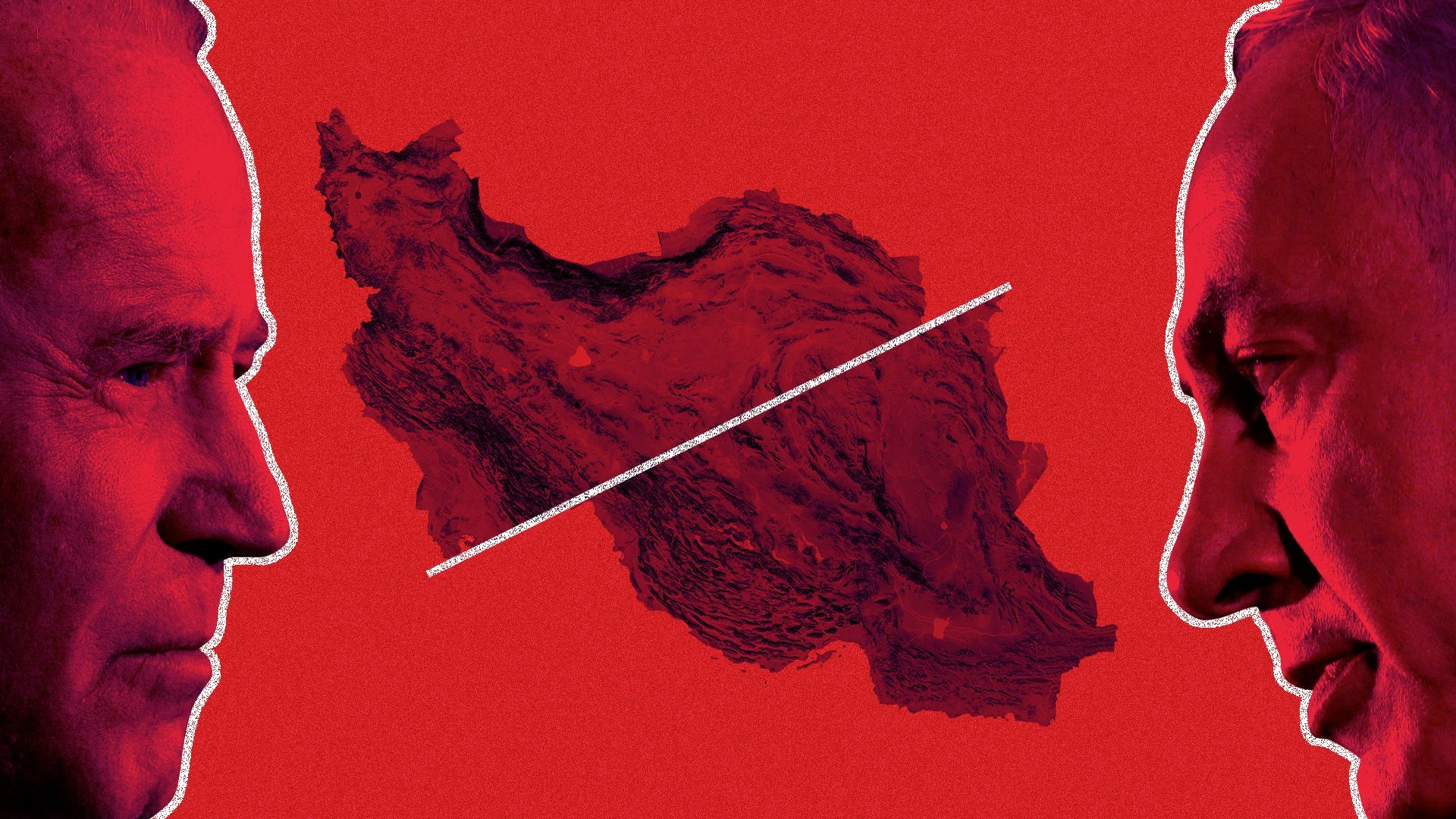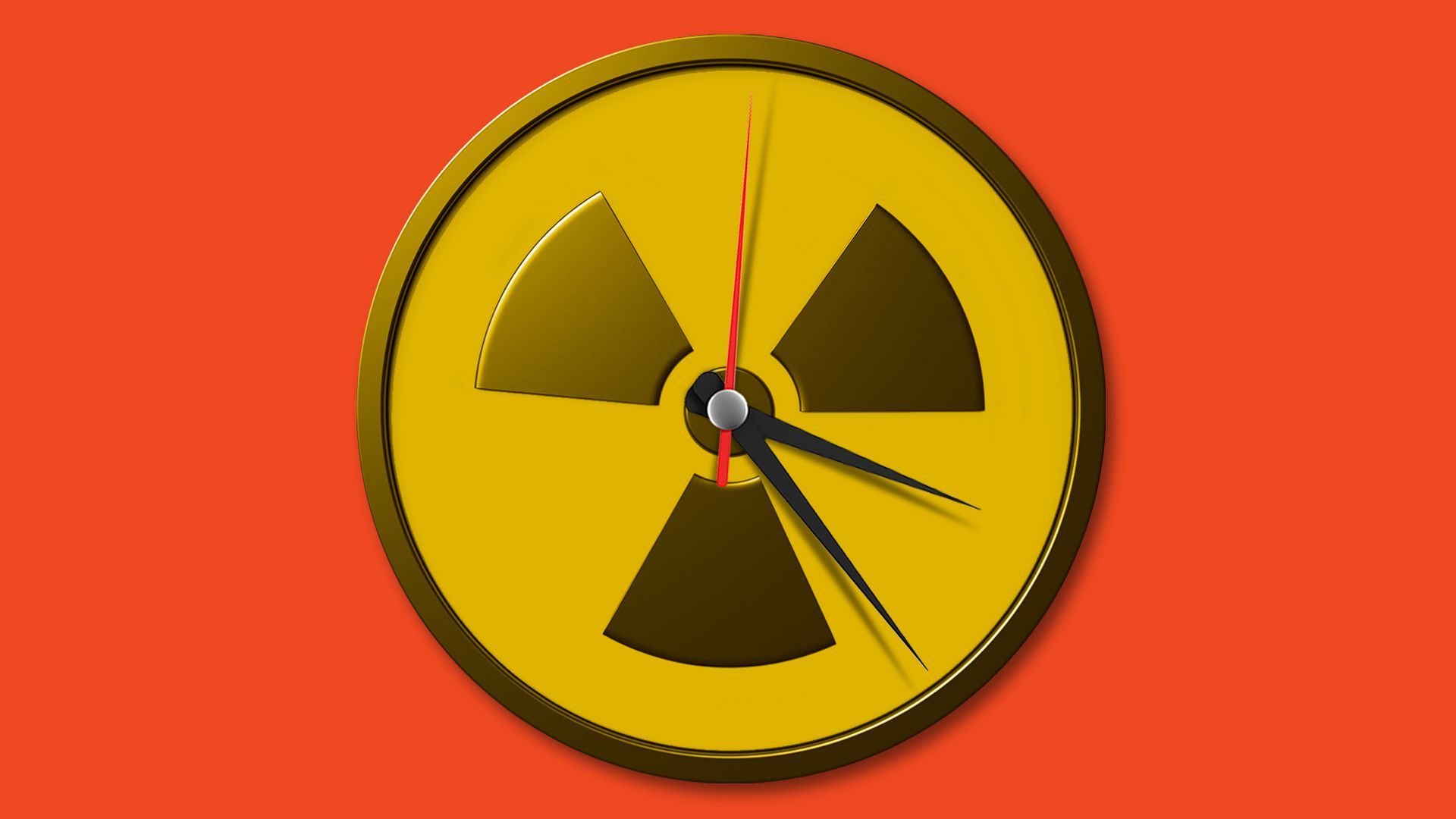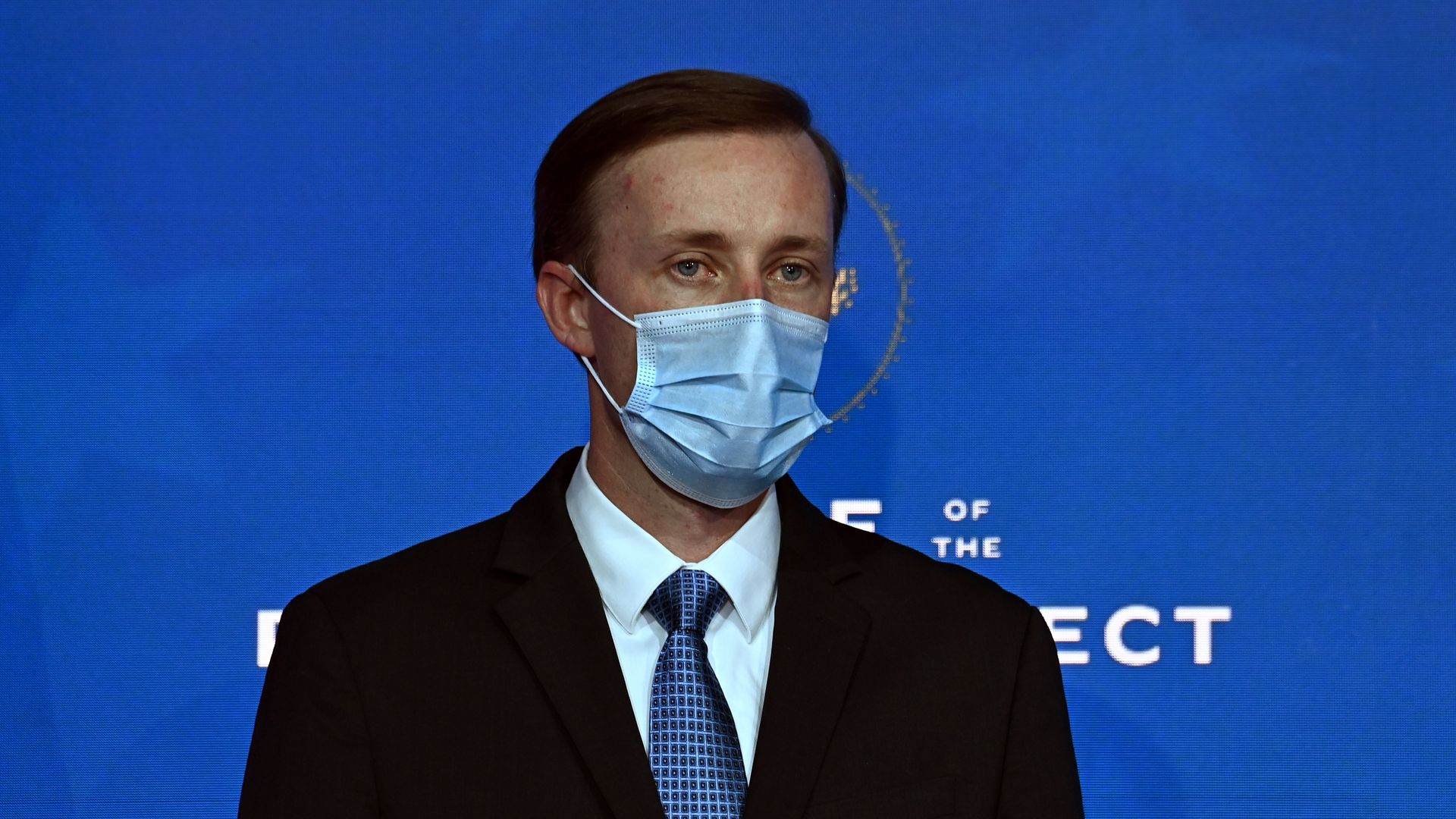| | | | | | | Presented By OurCrowd | | | | Axios World | | By Dave Lawler ·Jan 04, 2021 | | Welcome back to Axios World. - It's good to be back after a very relaxing break. I hope your holidays were merry and bright.
- Two weeks out from Joe Biden's inauguration, we're diving deep on the day one challenges he'll face, particularly on Iran (1,912 words, 7 minutes)
Situational awareness: Boris Johnson announced tonight that England will enter a six-week lockdown, as the spread of a highly contagious new coronavirus variant threatens to overwhelm the National Health Service. Go deeper. New arrival? Sign up here. | | | | | | 1 big thing: Biden's Iran conundrum |  | | | Photo illustration: Aïda Amer/Axios. Photo: Drew Angerer/Getty Images | | | | President-elect Joe Biden hopes to revive the Iran nuclear deal after taking office, but that task is only growing more daunting. Driving the news: Iran announced today that it would begin to enrich uranium to 20% — within striking distance of weapons-grade levels — at its underground Fordow facility. - Hours later, Tehran announced it had seized a South Korean-flagged tanker in the Strait of Hormuz, allegedly for pollution. That's another reminder to the world of Iran's ability to disrupt a crucial shipping corridor.
- Meanwhile, the U.S. and its regional partners continue to fear possible Iranian reprisals one year after the U.S. attack which killed Iranian Gen. Qasem Soleimani, as well as the more recent assassination of Iranian chief nuclear scientist Mohsen Fakhrizadeh.
State of play: In Biden's view, Iran's nuclear acceleration and the simmering regional tensions are consequences of President Trump's "maximum pressure" approach following his withdrawal from the 2015 deal. Biden is willing to lift the nuclear sanctions and bring the U.S. back into the deal — if Iran returns to compliance. - Incoming national security adviser Jake Sullivan told CNN's Fareed Zakaria on Sunday that after returning to the deal, known as the Joint Comprehensive Plan of Action (JCPOA), Biden will pursue follow-on negotiations to constrain Iran's regional behavior.
- Iran's ballistic missile program, Sullivan said, "has to be on the table" in those negotiations.
The other side: Iranian President Hassan Rouhani says Iran is prepared to return to compliance if the U.S. lifts its sanctions, indicating that the framework is in place. Look closer, though, and things get far more complicated. - If Iran enriches significant quantities of uranium to 20%, its nuclear breakout time will become "very, very small," says Ernest Moniz, who played a key role in negotiating the 2015 deal as Barack Obama's energy secretary. "The key question is how much they make."
The move toward 20% enrichment is part of a law — passed over Rouhani's objections — that also calls for the suspension of UN nuclear inspections if sanctions on Iran's oil and banking sectors aren't lifted by February. - That would be a "game-changer" beyond any of the steps Iran has taken up to now, Moniz says, because "then it becomes more and more difficult to argue that we know that they are not engaging in a weapons program."
Iran has also demanded compensation for the damage from U.S. sanctions, though Rouhani has shown some flexibility on that point. - More challenging may be the insistence from Foreign Minister Mohammad Javad Zarif that Iran is unwilling to negotiate on issues beyond its nuclear program — at least not before the U.S. lifts sanctions.
What's next: Iran also has presidential elections looming in June, with a hardline administration expected to replace Rouhani's. - Returning to the deal after being burned by Trump is an exceedingly contentious proposition.
- "It's probably the kind of thing that's easier for an outgoing administration to do, since the JCPOA's not the most popular item in some political circles in Iran," says Rob Malley, a former Middle East adviser to Obama and now president of the International Crisis Group. The direction of travel will ultimately be set by Iran's supreme leader, Malley adds.
What to watch: If Biden wants a deal with Rouhani, he'll have just five months to get it. |     | | | | | | Part II: Pros and cons |  | | | Photo illustration: Aïda Amer/Axios. Photos: Eric Baradat (AFP), Gali Tibbon (AFP)/Getty Images | | | | Biden will face fierce opposition to a swift return to the deal from Israel and the Gulf states, as well as Republicans and some Democrats in Congress. What they're saying: The opponents argue that Biden has been dealt a strong hand by Trump's "maximum pressure" campaign and he should play it carefully. "It's really an economic war that the U.S. is waging against Iran," says Gérard Araud, a former French ambassador to the U.S. (2014–2019) and permanent representative to the UN Security Council (2009–2014). "It's true that that gives the U.S. leverage." - There have already been a smattering of public comments from Israeli and Gulf officials discouraging Biden from returning to the 2015 deal and only then attempting to negotiate a deal addressing regional concerns.
- Sullivan's argument is that the U.S. will be better positioned to negotiate those issues once Iran's nuclear program is "back in a box."
One of the most contentious points will likely be sequencing. - Iran says it will return to compliance once the U.S. lifts sanctions, while Biden says he'll lift sanctions once Iran returns to compliance.
- That will require Iran to take a number of technical steps, including shipping enriched uranium out of the country, likely to Russia.
- The process could be completed in about four months, Moniz says — likely faster if Iran goes "all out," but slower in a staged process in which Iranian steps are paired with U.S. sanctions relief.
The other side: The Trump administration has attempted to block Biden's path back to the JCPOA, in part by piling sanctions on Iran for non-nuclear issues. - Biden could lift those sanctions without congressional approval — and the Iranians might demand that he do so — but Iran hawks hope the issue will become another domestic political minefield.
|     | | | | | | Part III: The path ahead |  | | | Illustration: Annelise Capossela/Axios | | | | Iran's recent nuclear acceleration, and its threat to expel inspectors, will likely be Biden's primary concerns in the near term — and these acts are clearly intended to force him to move quickly. Yes, but: "Some steps that Iran could take could backfire," Malley adds. "I think there comes a point at which more pressure might mean that the Biden administration will change course as well." Flashback: Three European signatories to the JCPOA — France, Germany and the U.K. — worked desperately over the two years following Trump's withdrawal to preserve the deal until the next U.S. election. - Now, the candidate who made salvaging the Iran deal a top priority is two weeks away from the Oval Office.
- But even he acknowledges that the path forward is uncertain. Tony Blinken, Biden's pick for secretary of state, has said the U.S. will work in partnership with Europe on Iran — whether or not Iran ultimately agrees to return to compliance.
What's next: European leaders and diplomats will attempt to facilitate dialogue between the U.S. and Iran, Araud says. - But he recalls years of fruitless European attempts to negotiate with Iran before the Obama administration took the issue on.
- The bottom line: "We knew from the beginning that the real issue was between the United States and Iran," he says, "and that's even more the case now."
|     | | | | | | A message from OurCrowd | | Proven tech could save governments billions fighting harmful algae | | |  | | | | Exponentially growing toxic algae blooms are poisoning water supplies globally and causing humanitarian crises. BlueGreen's Technology has been proven across five continents to eliminate toxic algae. Now, you can invest. Explore BlueGreen's ability to save our drinking water. | | | | | | 4. Biden's starting points |  | | | Jake Sullivan. Photo: Chandan Khanna/AFP via Getty | | | | Sullivan replied to reports last month that the EU was attempting to finalize an investment pact with China by calling for "early consultations with our European partners on our common concerns about China's economic practices." Between the lines: The message — in line with Biden's consistent call for U.S.-EU coordination on China — seemed to be that Brussels should hold off on the deal. Instead, the EU announced an "agreement in principle" last Wednesday. - Sullivan told Zakaria that was a "repudiation" of Donald Trump's approach" to China, rather than Biden's.
- Sullivan said Biden would keep Trump's tariffs on China in place for now, while consulting with allies about a shared approach to competition with China.
On Russia: Sullivan said indications that Russia was behind a massive cyberattack on government agencies and private companies were concerning because Russia had shown it was "prepared to go beyond espionage" — by targeting critical infrastructure and interfering in U.S. politics. - Biden will "respond at a time and place of his choosing," Sullivan said.
- The other side: Asked if there were any areas in which the U.S. could cooperate with Russia, Sullivan cited "an arms control and strategic stability agenda" — beginning with the extension of the New START nuclear treaty.
On Afghanistan: Sullivan suggested that Biden will essentially pick up where Trump left off on the diplomatic front — fostering intra-Afghan talks while holding the Taliban to their commitments to the U.S. — while ensuring that "Afghanistan never again becomes a safe haven for terrorists to attack the United States." - Background: Biden has previously expressed openness to leaving a counterterrorism force in Afghanistan while withdrawing most U.S. troops.
On the transition: Sullivan framed the refusal of Pentagon leaders over the last two months to coordinate meetings and provide information as a threat to national security, but he said those meetings were finally being scheduled. Go deeper: 10 former defense secretaries urge Pentagon to cooperate with Biden transition |     | | | | | | 5. Middle East: Deal reached on Gulf dispute |  | | | Saudi Crown Prince Mohammed bin Salman (L) and Qatar Emir Sheikh Tamim Bin Hamad Al-Thani. Photo: Fayez Nureldine/AFP via Getty Images | | | | Saudi Arabia, Qatar and other Gulf countries are expected to sign an agreement on Tuesday toward ending a diplomatic crisis in the Gulf after 3½ years, Axios' Barak Ravid reports. The big picture: A Saudi-led coalition severed ties with Qatar in 2017 and closed their airspace and sea routes to Qatari planes and vessels, citing Qatar's alleged support for terror groups and relations with Iran. Driving the news: Jared Kushner mediated between the parties and traveled to Saudi Arabia to participate in the signing during this week's Gulf Cooperation Council summit in Al Ula, Saudi Arabia. - The summit will be the first time Qatari Emir Tamim Bin Hamad al-Thani will visit Saudi Arabia since the crisis erupted in 2017.
- The leaders are going to sign an agreement that includes three confidence-building measures: Saudi Arabia, the UAE and Bahrain will lift the air and sea blockade of Qatar; Qatar will withdraw all lawsuits against its three Gulf neighbors; and all parties will stop their media campaigns against one another.
What they're saying: A senior diplomat from one of the Gulf countries tells Barak the agreement is a step in the right direction and includes some positive developments — but does not mark the end of the Gulf rift. - "Some of the issues were solved, but the root causes for the rift — bad personal relationships between the leaders and big policy differences on Iran, Turkey and the Muslim Brotherhood — are still there," the diplomat told me.
What to watch: Both Qatar and Saudi Arabia have close ties with the U.S. and see this as part of their efforts to clear the slate before Biden's inauguration. Go deeper |     | | | | | | 6. Europe: Coming and going |  | | | Merkel waves goodbye. Photo: Olivier Matthys/Pool/AFP via Getty | | | | 1. The U.K. set out on its own New Year's Day after securing a last-minute trade deal with the EU. What's next: The next crisis could be over the union. Scotland overwhelmingly opposed Brexit (62%-38%) in 2016, two years after it rejected independence (55%-45%). Now, the pro-independence cause is surging again. - But while First Minister Nicola Sturgeon says her party would bring an independent Scotland back into the EU, Prime Minister Boris Johnson says the next Scottish referendum should be decades away.
- Meanwhile, Johnson's trade deal places Northern Ireland in limbo — still a constituent of the U.K., but part of the EU trading bloc (that workaround was designed to avoid a hard border with the Republic of Ireland).
- An analogy: Imagine businesses in Alaska being able to trade freely with Canada and Mexico, but needing to fill out paperwork in order to import or export anything to the rest of the U.S., Axios' Felix Salmon writes.
2. We are now in the last of Angela Merkel's 16 years as German chancellor, as she has said she won't seek a fifth term in September. What's next: Merkel's CDU party will elect a new leader at a virtual party conference on Jan. 16. - The winner will likely lead Germany's dominant center-right political bloc into the election (though the popular leader of the CDU's Bavarian sister party, Markus Söder, could also lead the ticket).
- The leading candidates are conservative Friedrich Merz and Armin Laschet, a Merkel-style centrist.
- Flashback: Merkel's hand-picked successor, Annegret Kramp-Karrenbauer, initially took the CDU helm in 2018 but quickly flamed out.
3. Italy's government is in danger of collapse yet again, this time because of policy disputes between Prime Minister Giuseppe Conte and former prime minister Matteo Renzi, who leads a junior party in the coalition government. - The decisive moment could come on Jan. 7, when Conte will seek the Cabinet's support for his plan for Italy's economic recovery.
|     | | | | | | 7. Stories we're watching |  | | | A snowy Saturday in Germany's Harz Mountains. Photo: Ronny Hartmann/AFP via Getty | | | - Vaccinations: Israel leads world; China approves one; India approves two
- U.K. judge rules Assange shouldn't be extradited to U.S.
- Argentina to legalize abortion
- Hong Kong again jails Jimmy Lai; China jails fleeing activists
- Congress overrides Trump's veto of defense spending bill
- China's economy won 2020
- Post-Brexit Britain arrives
Quoted: "Efforts to involve the U.S. armed forces in resolving election disputes would take us into dangerous, unlawful and unconstitutional territory." — All 10 living former secretaries of defense in a Washington Post op-ed |     | | | | | | A message from OurCrowd | | BlueGreen's innovative tech could prevent environmental disaster | | |  | | | | Toxic algae blooms are expanding rapidly, poisoning our drinking water and causing billions in damage. BlueGreen Water Technologies has been proven in reservoirs, lakes and rivers across five continents to eliminate toxic algae. Invest early as BlueGreen helps save our drinking water. | | | | | | Axios thanks our partners for supporting our newsletters.
Sponsorship has no influence on editorial content. Axios, 3100 Clarendon Blvd, Suite 1300, Arlington VA 22201 | | | You received this email because you signed up for newsletters from Axios.
Change your preferences or unsubscribe here. | | | Was this email forwarded to you?
Sign up now to get Axios in your inbox. | | | | Follow Axios on social media:    | | | | | |
Post a Comment
0Comments